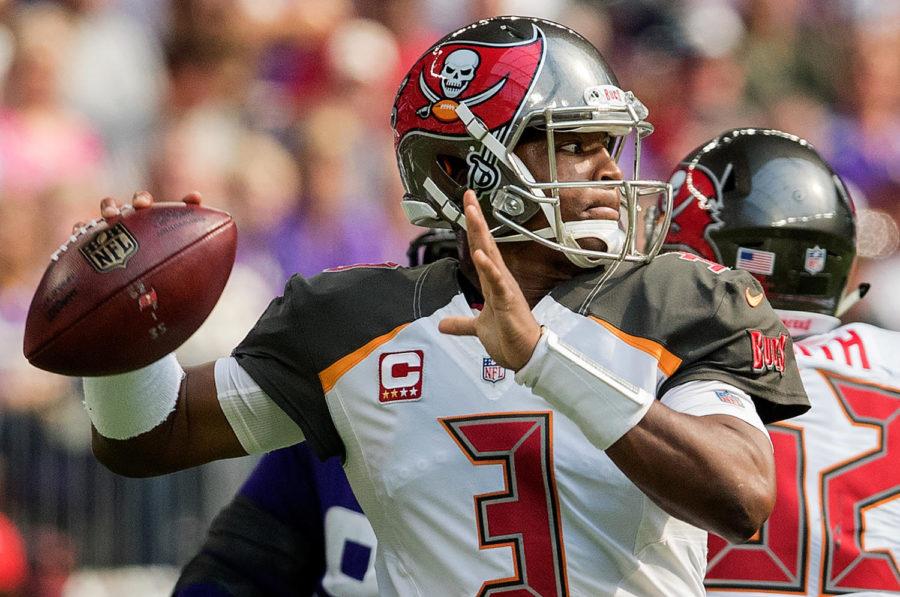When Tampa Bay Buccaneers starting quarterback Jameis Winston takes the field, the crowd is focused on one thing — the game.
Winston, at only 24 years old, is one of the best in the league. A former Florida State Seminole, he has had a stellar professional career so far — 12,149 all-purpose yards in only three seasons.
But when Winston was 18 years old, he was a part of a major incident in 2013 that left but a teeny tiny scratch on his record, an incident that cost FSU nearly $1 million in eventual settlements — a rape charge.
A charge that has largely been forgotten, especially by a dedicated fan base.
As the #MeToo movement continues to empower victims of abuse, many powerful but abusive men are losing their jobs over allegations, charges and court proceedings. But in a male-dominated industry like sports, where the voices of men heavily overpower those of women, it is harder to hear to the victims. Especially in college sports.
Fellow student Erica Kinsman filed the Title IX assault report, which the university and athletic department promptly and quietly dismissed. Kinsman alleged Winston raped her on the bathroom floor of his apartment in December of 2012 after meeting the star freshman quarterback at a bar.
Kinsman did everything right after the horrific incident. She went to the hospital for treatment and received a rape kit — which, months later, did conclude Winston had intercourse with her — and filed a police report.
The police did nothing for 10 months, and when Kinsman expressed her concerns, she was met with skepticism and shoulder-shrugging.
Sadly, this is a familiar story for many women in the United States who are victims of sexual assault.
On top of it all, what happened to Winston’s career was egregious — it got better.
At the school’s eventual code of conduct hearing in 2016, days before the college football playoffs, Winston was cleared of any wrongdoing and allowed to play for the Seminoles.
This incident is not isolated. Last summer, Stanford swimmer Brock Turner was discovered brutally raping an unconscious woman in a back alley. He was found guilty, but was only sentenced to jail for a mere six months. The judge felt that giving the young scholarship athlete a longer sentence would have a “severe impact” on Turner, and his life would suffer severe “collateral consequences.”
Of course, these examples of abuse toward women are not exclusive to the collegiate level. According to data compiled by USA Today, about 12 percent of arrests of NFL players since 2000 have been for domestic violence.
The NFL has been taking steps to punish players who are accused of violence against women.
If an athlete is accused of or charged with violence against women, the player will be penalized without pay. According to the NFL personal conduct policy, put into place in 2014, “violations involving assault, battery, domestic violence or sexual assault will result in a baseline six-game suspension without pay, with more if aggravating factors are present, such as the use of a weapon or a crime against a child.”
“Domestic violence and sexual assault are wrong. They are illegal,” NFL Commissioner Roger Goodell wrote in a letter to team owners that announced the new policy. “They have no place in the NFL and are unacceptable in any way, under any circumstances.”
But in college sports, no such policy exists. And on a collegiate level — athlete or not — the numbers aren’t good to begin with. A little more than 23 percent of female undergraduate college students are sexually assaulted. Of those, only 12 percent will report, according to the National Criminal Justice Reference Service.
The National Collegiate Athletic Association released a new sexual assault policy in 2017, but it was hardly comprehensive. The policy iterated multiple times that student athletes and coaches must attend yearly training on sexual violence prevention and that administrators must be held accountable for these sessions.
There was no mention of punishment in the press release, and there is no previous policy that contains it, either.
As students held to a higher standard on campus, student athletes should be treated with more scrutiny when it comes to sexual violence, not less. As more women say #MeToo to being victims of sexual assault, collegiate athletic departments should consider adjusting their policies accordingly.
After Winston was accused of sexual assault, he went on to win the 2013 Heisman Trophy, an award that honors a player “whose performance best exhibits the pursuit of excellence with integrity.”
Meanwhile, his victim was still receiving death threats from peers and football fans who claimed she was attempting to ruin his career. Kinsman was forced to drop out of FSU — a school the Tallahassee native had dreamt of attending since she was a child.


